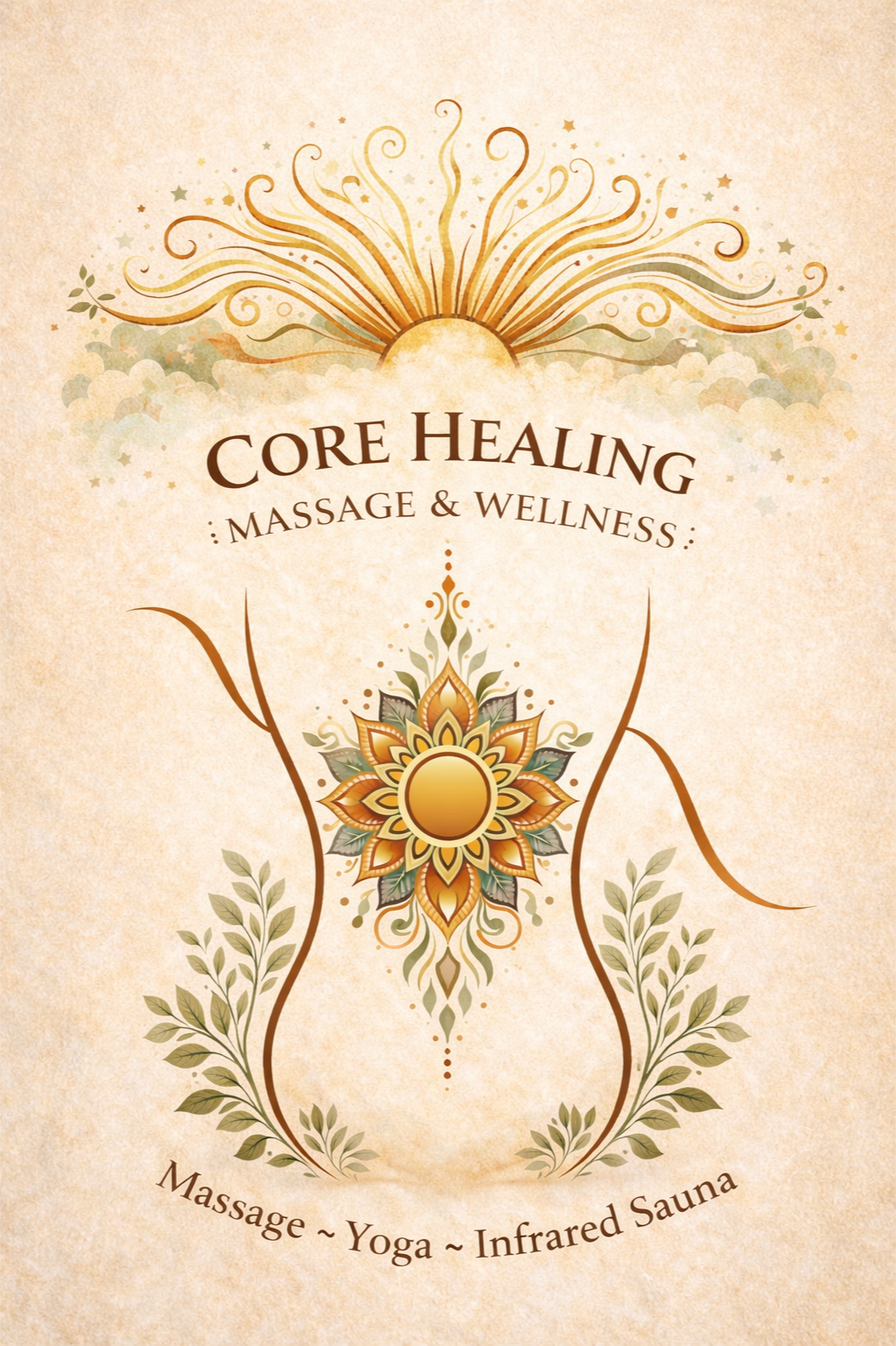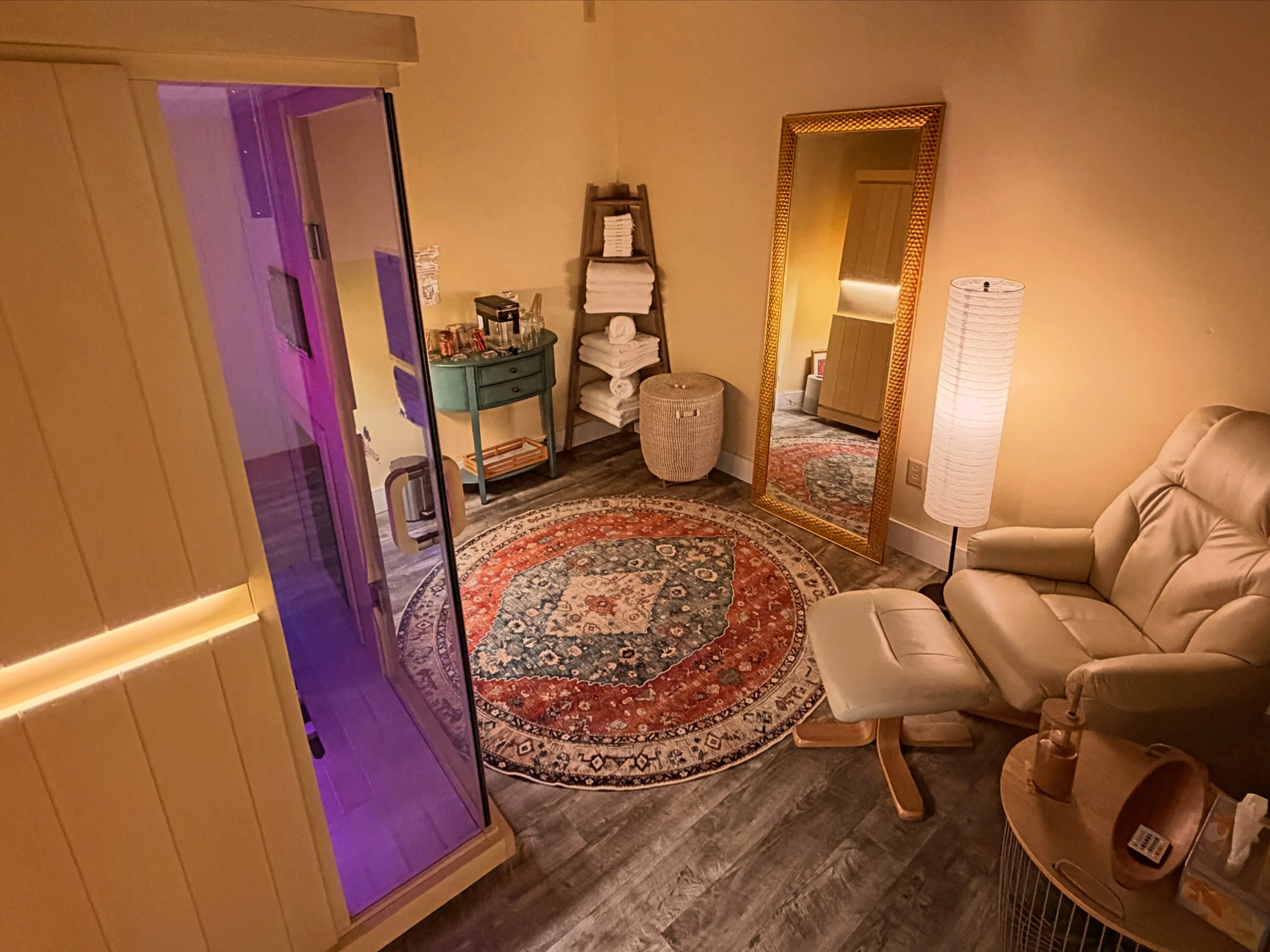
Infrared Sauna.
At Core Healing, the infrared sauna is offered as more than a wellness modality —
it is a ritual of restoration.
Gentle, penetrating warmth invites the body to soften, the nervous system to settle, and the mind to quiet. As heat moves deeply into muscles and tissues, the body is supported in releasing what it no longer needs — physically, emotionally, and energetically.
This is time intentionally set aside for renewal.
The Infrared Experience.
Each Session takes place in a private room, designed for safety and grounding.
Sauna as a Ritual
We encourage clients to approach sauna sessions as a practice, not a quick fix.
Consistent use can support:
Greater resilience to stress
Improved recovery between massage or movement sessions
A deeper sense of embodiment and calm
Many clients choose to pair infrared sauna sessions with massage therapy for a profoundly restorative experience.
Within, You are Invited to:
~Slow Your Breath
~Settle into Stillness
~Allow warmth to do the work.
This Offering is Especially Supportive for :
~ Chronic stress or burnout
~ Muscle or joint discomfort
~Fatigue or Poor Sleep
~ A sense of Emotional or Energetic Heaviness
~A desire to Reconnect with your body in a gentle way
What to Expect
~Private infrared sauna session
~ Clean, quiet, and intentionally prepared space
~ Time to rest before and after your session
~ Hydration Provided with Electrolytes for purchase
~ Sessions that are unhurried and designed to support your comfort and well-being.
What You’ll Need
~ A bathing suit or change of Undergarments
~ Perhaps a Water Bottle for Easy, spill proof Hydration.
We Provide the rest :
~ Clean, high quality towels & face cloths
~ Fresh Filtered Water
~ Soft Music for Relaxation & Restoration
~ The Space you need to Settle into Calm
What is Infrared?
Infrared is found in nature and is necessary light for life.
• Nature brings us infrared light. It’s the healthy, healing rays that come from the sun. You’ve felt
infrared your entire life. When you sit next to a fire or feel the warmth of the sun on your skin.
Infrared also helps plants bloom - just the right amount helps stems grow fast and strong. All living
things need it to grow and flourish.
• Sunlight is 52-55% infrared. It’s all the good parts of the sun’s healing light.
• The experience of an infrared treatment is similar to sunbathing, giving you that wonderful natural
warmth. Unlike sunbathing, infrared heat therapy is completely healthy and safe. You can relax in an
infrared sauna and it will never cause your skin to burn.
Infrared is part of a natural spectrum.
• Remember the first time you saw a prism transform light into a rainbow of visible light? Infrared is
the invisible light just outside the prism next to red light, thus the name “infra (below)” + “red.”
• Infrared consists of 3 wavelengths: near, mid and far.
• Visible light and infrared are part of the electromagnetic spectrum, a continuum of light waves
organized by how they interact with matter. Scientists explain infrared as a safe, gentle form that
brings many good, healthy things to earth and human beings.
Infrared heats the body directly rather than simply heating the air.
• Infrared penetrates human tissue, and the energy it delivers is just the right nudge cells need to
stimulate warmth, growth and release.
• Infrared is effective at a low, soothing temperature.
• It is completely healthy and safe for all living things. It’s even used in hospitals to warm newborn infants.
What is Infrared.
~Here are the Basics of infrared Technology and what to expect from your experience !
Important Disclaimers
Sunlighten infrared saunas operate with the same efficacy as in a medical facility. Like all professional
equipment, you may put yourself at risk if you do not fully understand how to use the sauna.
Infrared sauna use as creating a cure for or treating any disease is neither implied nor should be
inferred. Drinking an electrolyte-replacing water or a sports drink is strongly recommended before
and after use.
MEDICAL CONDITIONS
If any of the below apply to you, consult your physician prior to sauna use:
• Cardiovascular Issues, Obesity or Diabetes –
Individuals suffering from obesity or with a
medical history of heart disease, low or high blood pressure, circulatory problems, or diabetes
should consult a physician prior to use. Heat stress increases cardiac output and blood flow in
an effort to transfer internal body heat to the outside environment via the skin (perspiration) and
respiratory system. This takes place primarily due to major changes in the heart rate, which has
the potential to increase by thirty (30) beats per minute for each degree increase in core body
temperature.
• Medications –
Individuals who are using prescription drugs should seek the advice of their
personal physician since some medications may induce drowsiness, while others may affect heart
rate, blood pressure and circulation. Diuretics, barbiturates, and beta-blockers may impair the
body’s natural heat loss mechanisms. Anticholinergics, such as amitriptyline, may inhibit sweating
and can predispose individuals to heat rash or to a lesser extent, heat stroke. Some over-the-
counter drugs, such as antihistamines, may also cause the body to be more prone to heat stroke.
• Alcohol & Drug Abuse –
Contrary to popular belief, it is not advisable to attempt to “sweat
out” a hangover. Alcohol intoxication decreases a person’s judgment; therefore, he/she may not
realize when the body has a negative reaction to high heat. Alcohol also increases the heart rate,
which may be further increased by heat stress. The use of alcohol, drugs, or medications prior to
a sauna session may lead to unconsciousness.
• Elderly –
The ability to maintain core body temperature decreases with age. This is primarily due
to circulatory conditions and decreased sweat gland function. The body must be able to activate
its natural cooling processes in order to maintain core body temperature. If elderly, operate at a
lower temperature and for no more than 15 minutes at a time.
• Children –
The core body temperature of children rises much faster than adults. This occurs due
to a higher metabolic rate per body mass, limited circulatory adaptation to increased cardiac
demands, and the inability to regulate body temperature by sweating. When using with a child,
operate at a lower temperature and for no more than 15 minutes at a time.
Please Forego Use if the following apply to you :
Hemophiliacs or those prone to bleeding
If Under the influence of alcohol or drugs
Fever or Insensitivity to heat, until fever subsides.
( Sauna induces a higher core body temperature, similar to that of a fever, so should not be used if fever symptoms are already present.)
• Joint injury : Recent (acute) joint injury should not be heated for the first 48 hours or until the swollen symptoms subside.
Joints that are chronically hot and swollen may respond poorly to vigorous heating of any kind.
